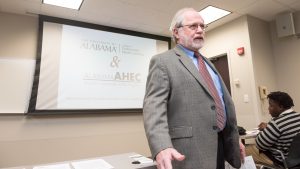The University of Alabama’s College of Community Health Sciences announced a new partnership between the CCHS and Alabama Statewide Area Health Education Centers to extend educational and training opportunities to high school students in rural areas of Alabama.

“The partnership serves the mission of the College to continue to support the region in terms of leadership in medical education and scholarship through its assistance to our area partners,” said Dr. Richard Streiffer, dean of CCHS. “Area Education Health Centers have become established nationwide, and this is a historic role in which they have deep experience and success. We are pleased to help Alabama AHECs assume this role for the benefit of our state and its communities.”
For the past 25 years, the College’s rural programs have operated as a pipeline to prepare high school juniors and seniors for opportunities in health care after graduation and before they begin college.
In recognition of the positive impact that AHECs have throughout the state, the College determined that the opportunities for high school students would be exponentially higher with the network currently in place, beyond medical school and including other health care professions. The organization will now assume the lead role for implementing year-round and after-school health profession education programs.
“We are so appreciative of the opportunity to assume responsibility of the CCHS rural high school programs,” said Dr. Cynthia Selleck, director of the Alabama Statewide Area Health Education Centers. “We have a long history of working with high school students. It’s an area where we really shine, and we thank CCHS for their confidence in us to continue to move these programs forward.”
Created by Congress in 1971, Area Health Education Centers work to increase the quantity, diversity and distribution of health care professionals, especially in rural and underserved areas. Research has shown that positive changes to these three areas increase access to care and improve the overall health of communities.
Following the final transition of all high school programs to the organization’s management, the College of Community Health Sciences will continue to develop future medical professionals through the Rural Medical Scholars, Rural Community Health Scholars and Family Medicine Residency programs while providing oversight to new high school programs.
